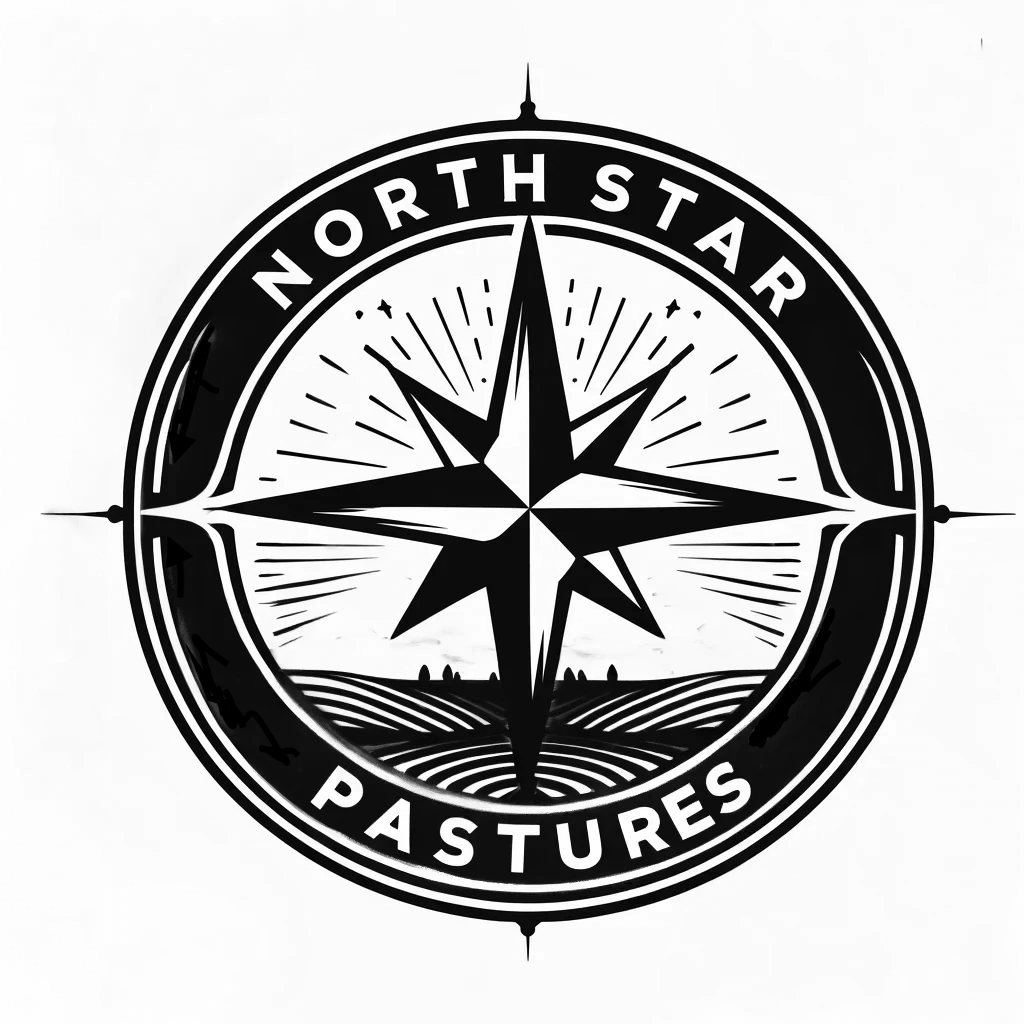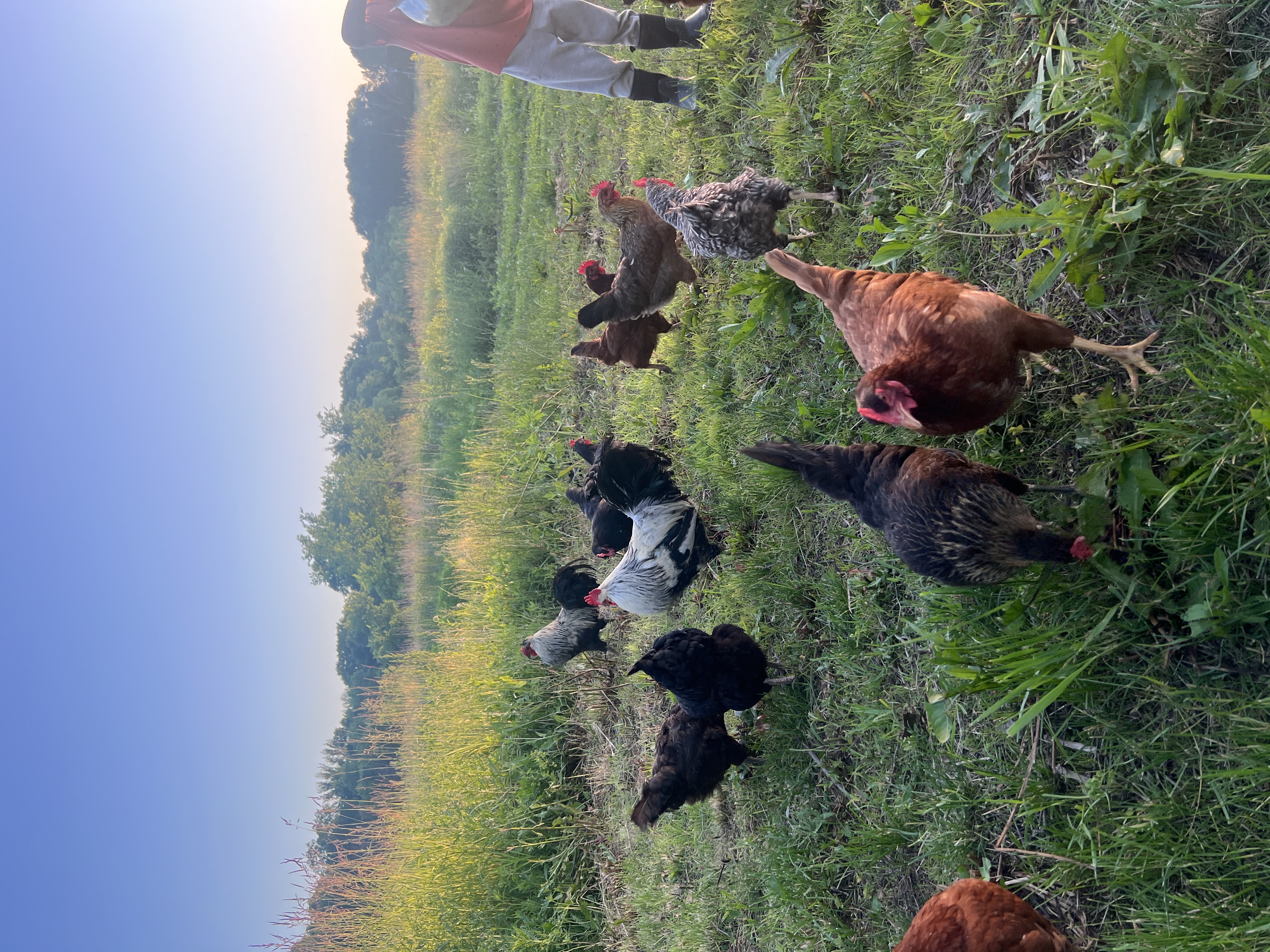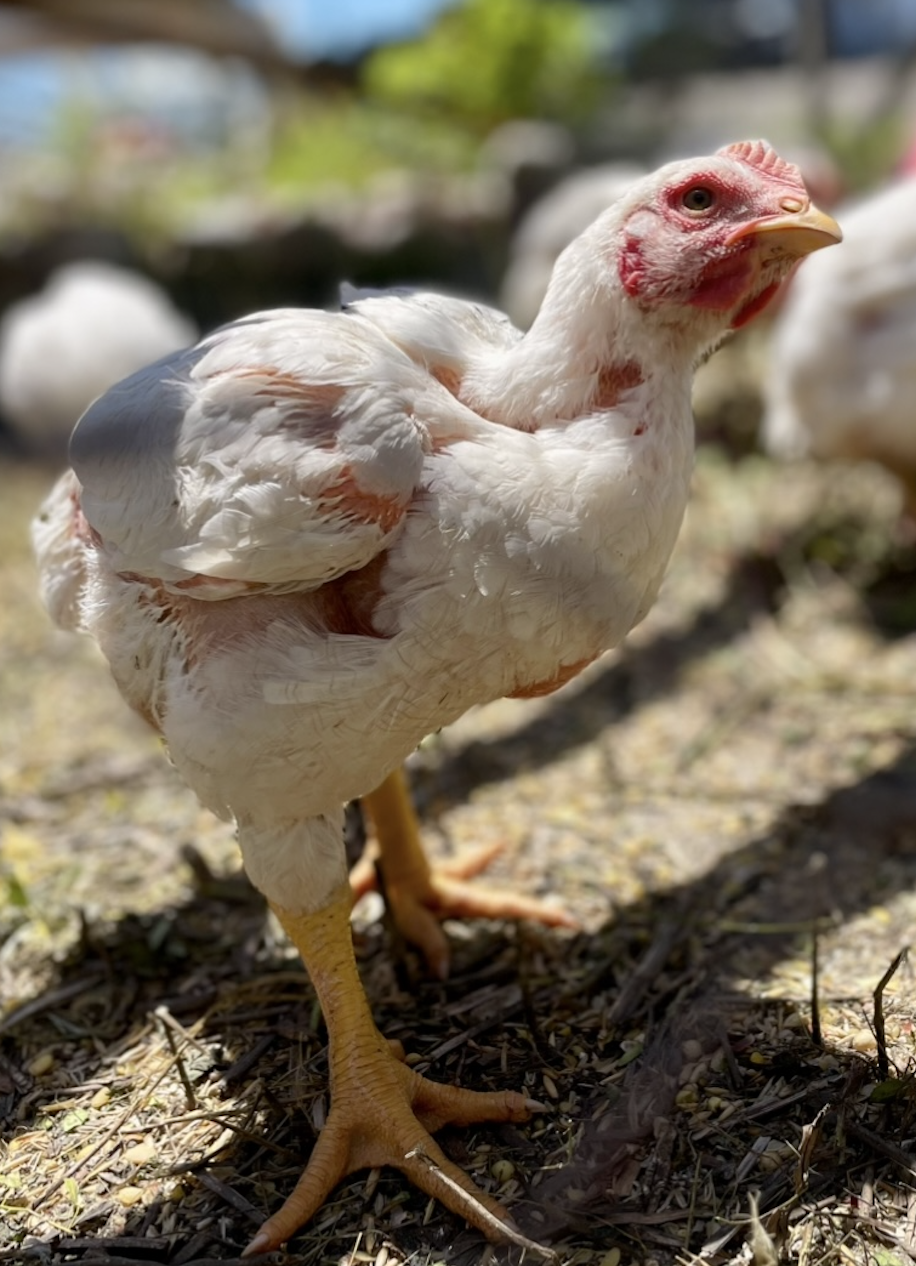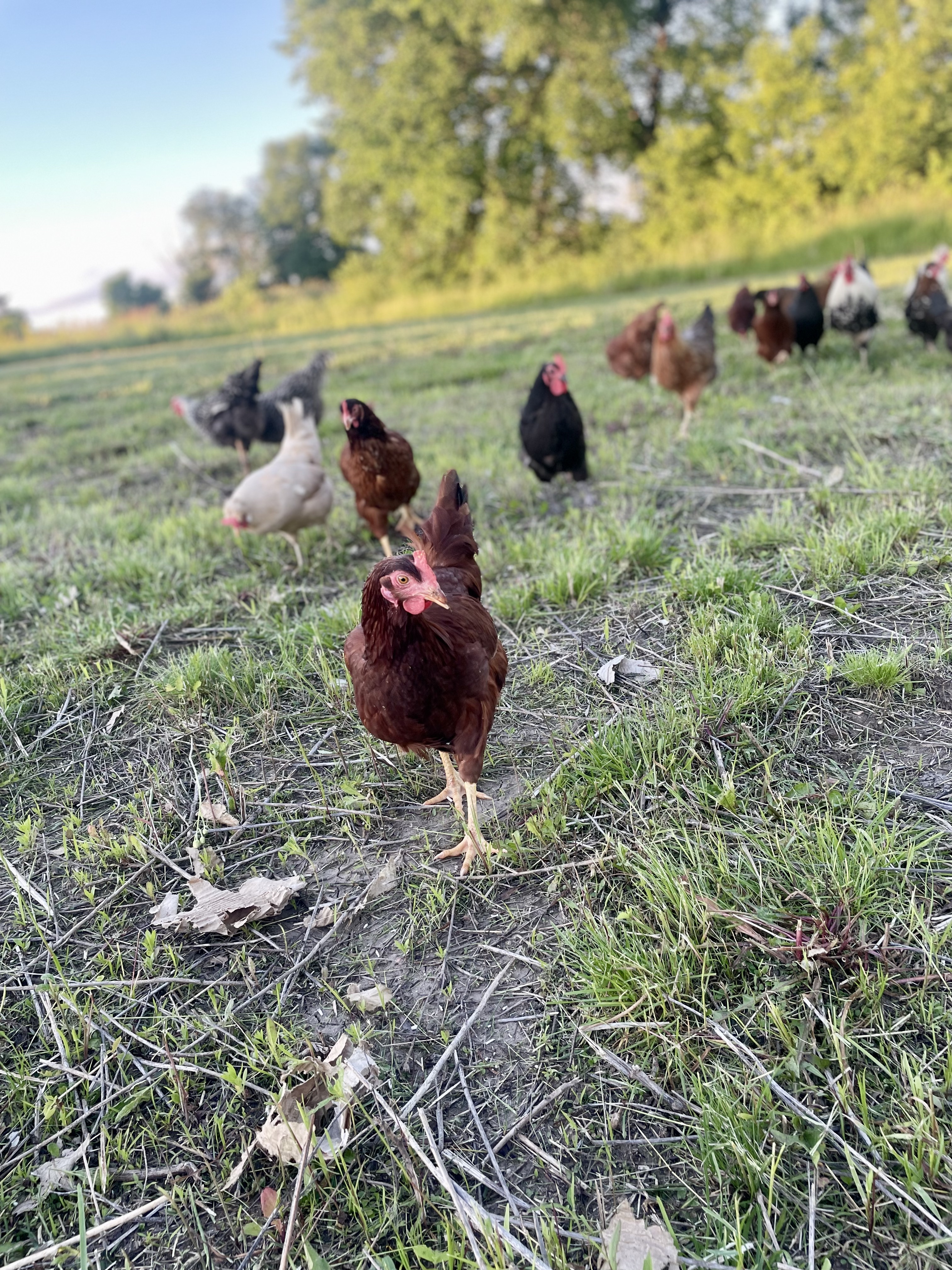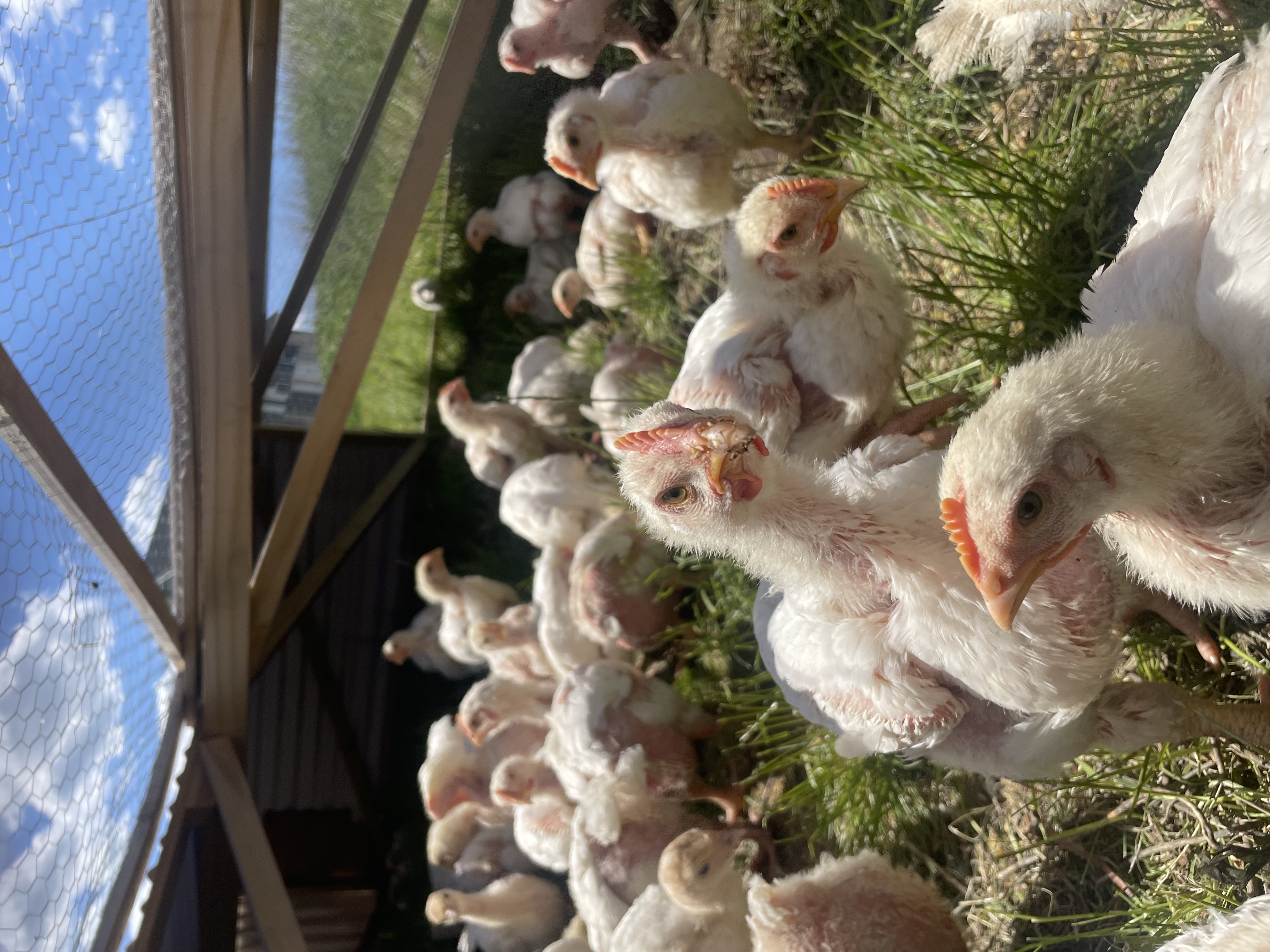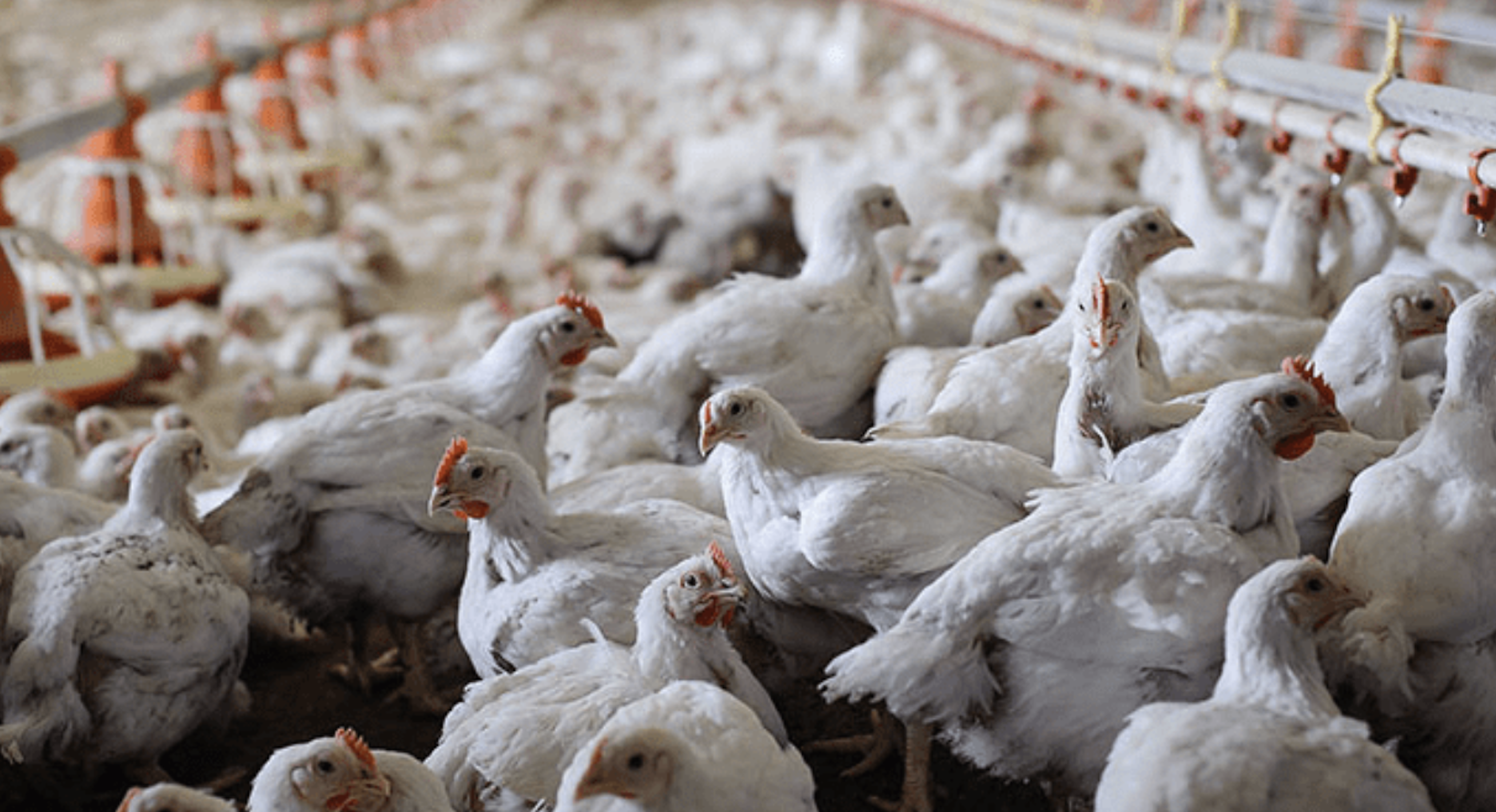At North Star Pastures, we raise heritage breed layers like Rhode Island Reds and Barred Plymouth Rocks. These beautiful, colorful birds are phenomenal egg producers when raised on pasture, laying eggs with deep orange yolks packed with nutrition.
Our heritage layers are hardy and self-sufficient, thriving in our mobile pasture system. They're active birds that love to forage for insects and seeds, which contributes to those nutrient-dense eggs you won't find in grocery stores.
A good heritage hen will lay around 200-250 eggs per year – plenty productive without pushing them to the extremes of commercial white leghorn hybrids that often burn out quickly. Our hens have strong constitutions and can be productive for several years, not just a few months.
For our meat birds, we raise the Cornish Cross breed. These are the standard meat chickens that dominate the industry, and for good reason – they grow efficiently and produce exceptional meat. The difference is how we raise them.
Cornish Cross broilers are white-feathered, broad-breasted birds that put on muscle quickly. They have a different body shape entirely from our layers – much stockier with significantly more breast meat. While our layers are active and always on the move, our broilers are more content to graze within a smaller area.
How Did We Get Here? The Rise of the Specialized Chicken
It all started in the 1920s when American agriculture began shifting from diversified small farms to more specialized operations. Before this shift, most homesteads kept dual-purpose breeds (like the Rhode Island Reds and Barred Rocks we use for eggs) that provided both eggs and, when their production declined, meat for the stew pot.
The Birth of the Modern Broiler
Everything changed in 1923 when a Delaware farmer named Cecile Steele accidentally received 500 chicks instead of the 50 she ordered. Rather than returning them, she raised them all for meat and discovered there was good money in specialized meat production.
This happy accident launched the American broiler industry. Over the following decades, intensive breeding programs like the famous "Chicken of Tomorrow" contest in the 1940s created the modern broiler chicken – most notably the Cornish Cross breed that dominates today's meat market.
The Cornish Cross isn't a traditional breed but a specialized hybrid developed specifically for meat production. It's a cross between heritage breeds (historically a White Cornish and a White Plymouth Rock) that yields a chicken with exceptionally fast growth and lots of breast meat.
These specialized meat chickens can grow to market weight of 5+ pounds in just 6 weeks in conventional systems. They convert feed to meat with remarkable efficiency, but in industrial settings, they're often pushed so hard that they can barely walk properly by slaughter time.
The Industrial Reality: Factory vs. Pasture
The differences between conventional and pasture-raised chickens are stark:
Conventional Broilers: Raised in massive barns with tens of thousands of birds, each allocated less than one square foot of space. They never see sunshine or feel fresh air. These birds grow so rapidly that their legs often can't support their weight, leading to painful conditions and difficulty moving. Many spend their final weeks sitting in waste because walking is too painful.
Conventional Layers: Typically confined in battery cages or, increasingly, in cage-free barns where thousands of hens are packed together. These birds never see sunshine, never scratch in soil, and never chase insects. They're fed a diet designed solely to maximize egg output.
The North Star Pastures Difference
At North Star Pastures, we take a radically different approach. While we do use different breeds for egg laying and meat production (because specialization does have benefits), we raise both types with the same core philosophy: let chickens be chickens.
Our Pasture-Raised Layer Approach
Our heritage breed layers live as nature intended. They spend their days outside on fresh pasture, scratching for bugs, eating grass, and soaking up sunshine. We move them regularly to fresh pasture where they can express all their natural behaviors while fertilizing the soil.
This natural lifestyle produces eggs with deep orange yolks and significantly higher nutritional content than conventional eggs. The rich color doesn't come from additives – it comes from carotenoids in plants and insects the hens consume while foraging.
Our Pasture-Raised Broiler Approach
Our broiler chickens (Cornish Cross) start their lives in a warm brooder for the first three weeks. We use a deep-bedding system of pine shavings that acts like a living compost beneath the chicks' feet. This creates natural warmth, supports healthy immune development, and eliminates the need for antibiotics. The same bedding later becomes nutrient-rich compost for our pastures and garden – completing the natural cycle.
Once feathered, they move to our mobile pasture pens that are moved to fresh pasture EVERY DAY.
While industrial farms push Cornish Cross birds to market weight in just 6 weeks, we raise ours for a full 8 weeks on pasture. This extended time is a deliberate choice for quality that makes all the difference.
What conventional producers see as merely "growth time," we see as proper development. On pasture, chickens live as nature intended, and here's why that extra time creates a better chicken:
When chickens have room to move, they exercise more, burning calories that would otherwise become fat. They experience natural temperature variations that require energy to regulate body heat. They forage for insects and greens, which dilutes the calorie density of their diet compared to birds that only eat high-energy feed pellets. And they follow natural day/night cycles instead of being kept under artificial lights for 23 hours a day to maximize feeding time.
All these factors mean our birds grow more slowly but develop better muscle texture, improved flavor, and a healthier fat profile. The 8-week growout is a premium feature that delivers a superior product.
Moving the pens daily ensures our broilers always have fresh grass, bugs, and clean ground underneath them. This daily rotation keeps them healthy without antibiotics or medications of any kind while building soil fertility. It's a win-win approach – better for the birds, better for the land, and ultimately better for your table.
Why It Matters: Flavor, Welfare, and Real Food Quality
You might wonder why we go through all this trouble. Industrial farms raise chickens by the tens of thousands in climate-controlled barns with high-tech feeding systems. It's efficient and cost-effective, no doubt. However, we believe efficiency isn't everything. Flavor, animal welfare, soil health, and food quality are the pillars of our approach.
Flavor & Nutrition
Chicken is not just chicken. How a bird is raised profoundly affects how it tastes and its nutritional profile. Our broilers roam on grass and eat a diverse diet, and you can taste the difference. Pasture-raised chicken develops a richer, more robust flavor – the dark meat is silky and the white meat actually has character.
Research shows that chickens with access to pasture and a natural diet have more omega-3 fatty acids and more vitamins in their meat. Studies have found that pasture-raised chickens can contain up to three times more omega-3s and double the Vitamin E compared to conventional grocery store chicken. They even contain measurable vitamin D that conventional chicken lacks, thanks to that sunshine exposure.
Choose North Star Pastures for Better Chicken
When you choose pasture-raised chicken from North Star Pastures, you're saying no to industrial food. You're saying no to a system that makes our community and environment sick. Choosing pastured chicken means participating in the creation of an alternative – one that's better for you, your family, and your community.
Understanding the difference between layers and broilers – and more importantly, how they're raised – helps you make informed choices about the food on your table. When you choose eggs or meat from pasture-raised chickens, you're getting:
- Superior nutrition from animals that ate diverse, natural diets
- Cleaner products from birds that didn't need routine antibiotics to stay healthy
- More humane treatment for the animals that provide your food
- Environmental benefits from regenerative farming practices
Join us and choose North Star Pastures pasture-raised chicken and eggs – the way chicken ought to be!
